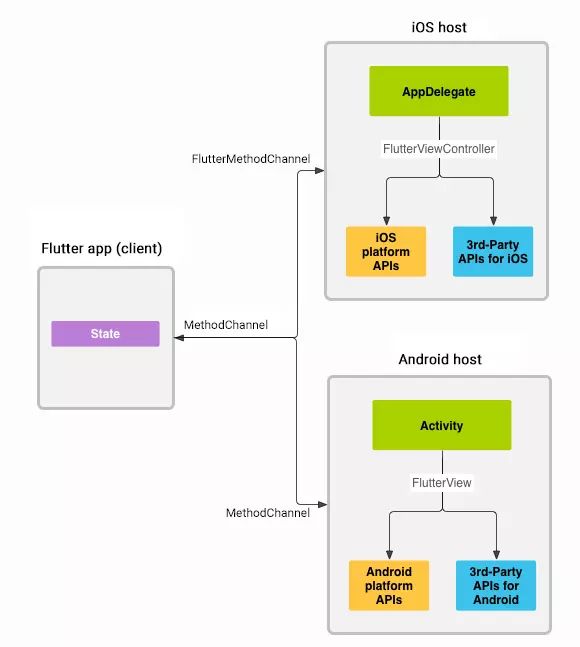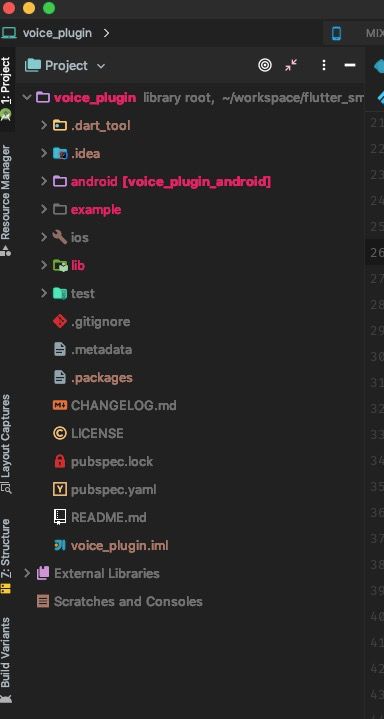Flutter 插件开发
Flutter 汇总请看这里
文章目录
- Flutter插件 解决什么问题
- 通信原理
- 支持传递的数据类型
- step1 创建插件工程
- MethodChannel是如何交互
- step2 编写Api和不同平台的实现
- flutter插件实例
- step2.1 定义api
- step2.2 实现android API
- step2.3 实现iOS API
- step2.4 flutter 调用
- Flutter调用原生并传递数据
- 在平台接收Flutter传递过来的数据
- 从平台回调结果给Flutter
- 平台如何调用Flutter
Flutter插件 解决什么问题
Flutter是一种跨平台框架,一套代码在Android和iOS上运行,那么当一些功能在两端需要不同的实现比如权限申请,三方api调用,这时Flutter Plugin就可以发挥作用,它包含一个用Dart编写的API定义,然后结合Android和iOS的平台不同实现。达到统一调用的目的
通信原理
消息通过platform channels在客户端(UI)和主机(platform)之间传递,如下图所示:
在Flutter层,MethodChannel(API)允许发送与方法调用相对应的消息。 在平台层面也就是Android或者iOS,Android(API)上的MethodChannel和iOS(API)上的FlutterMethodChannel启用接收方法调用并发回结果。 可以使用非常少的“样板”代码开发平台插件。
支持传递的数据类型
既然要通信,那么一下两个问题就不仅浮现在眼前
MethodChannel传递的数据支持什么类型?
Dart数据类型与Android,iOS类型的对应关系是怎样的?
结论如下:
| Dart | Android | iOS |
|---|---|---|
| null | null | nil (NSNull when nested) |
| bool | java.lang.Boolean | NSNumber numberWithBool: |
| int | java.lang.Integer | NSNumber numberWithInt: |
| int if 32 bits not enough | java.lang.Long | NSNumber numberWithLong: |
| double | java.lang.Double | NSNumber numberWithDouble: |
| String | java.lang.String | NSString |
| Uint8List | byte[] | FlutterStandardTypedData typedDataWithBytes: |
| Int32List | int[] | FlutterStandardTypedData typedDataWithInt32: |
| Int64List | long[] | FlutterStandardTypedData typedDataWithInt64: |
| Float64List | double[] | FlutterStandardTypedData typedDataWithFloat64: |
| List | java.util.ArrayList | NSArray |
| Map | java.util.HashMap | NSDictionary |
step1 创建插件工程

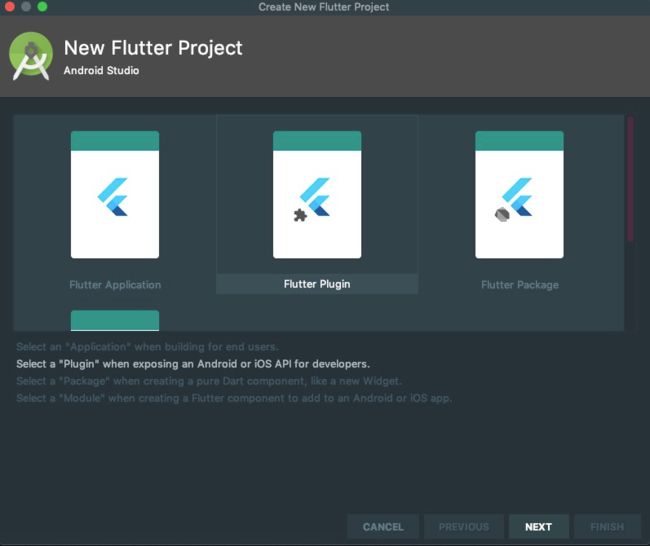
File->New->New Flutter Project 选择Flutter Plugin 起个名字一路next
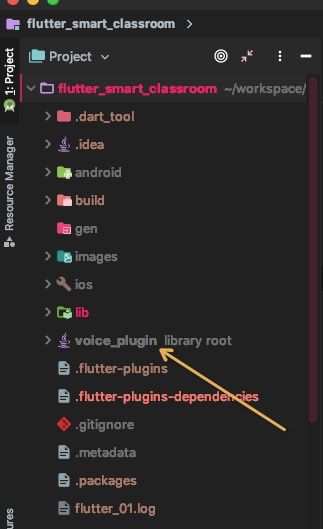
此时我们创建了一个名为voice_plugin的插件
我们着重了解一下以下三个文件
lib/voice_plugin.dart ——Api定义类
android/src/main/java/demo/roobo/com/voice_plugin/VoicePlugin.java ——android实现类
ios/Classes/VoicePlugin.m ——ios实现类
MethodChannel是如何交互
交互就是通过MethodChannel。MethodChannel负责dart和原生代码通信。voice_plugin是MethodChannel的名字,flutter通过一个具体的名字能才够在对应平台上找到对应的MethodChannel,从而实现flutter与平台的交互。同样地,我们在对应的平台上也要注册名为voice_plugin的MethodChannel。
lib/voice_plugin.dart
class VoicePlugin {
static const MethodChannel _channel = const MethodChannel('voice_plugin');
static Future<String> get platformVersion async {
final String version = await _channel.invokeMethod('getPlatformVersion');
return version;
}
}
Android注册名为voice_plugin的Channel
public class VoicePlugin implements MethodCallHandler {
private static final String TAG = "VoicePlugin";
/**
* Plugin registration.
*/
public static void registerWith(Registrar registrar) {
final MethodChannel channel = new MethodChannel(registrar.messenger(), "voice_plugin");
channel.setMethodCallHandler(new VoicePlugin());
Log.e(TAG, "init: mContext");
}
@Override
public void onMethodCall(MethodCall call, Result result) {
switch (call.method) {
case "getPlatformVersion":
result.success("Android " + android.os.Build.VERSION.RELEASE);
break;
default:
result.notImplemented();
break;
}
}
}
ios注册名为voice_plugin的Channel
public class SwiftVoicePlugin: NSObject, FlutterPlugin {
public static func register(with registrar: FlutterPluginRegistrar) {
let channel = FlutterMethodChannel(name: "voice_plugin", binaryMessenger: registrar.messenger())
let instance = SwiftVoicePlugin()
registrar.addMethodCallDelegate(instance, channel: channel)
}
public func handle(_ call: FlutterMethodCall, result: @escaping FlutterResult) {
result("iOS " + UIDevice.current.systemVersion)
}
}
@implementation VoicePlugin
+ (void)registerWithRegistrar:(NSObject<FlutterPluginRegistrar>*)registrar {
[SwiftVoicePlugin registerWithRegistrar:registrar];
}
@end
至此,Flutter与原生的桥接已经完成
step2 编写Api和不同平台的实现
编写不同平台实现的时候你会发现没有提示,甚至连包依赖都找不到,而且ide在提示你 编写特定平台的代码时 你需要以工程身份打开项目 点解即可


我们打开android 工程
如下图 :
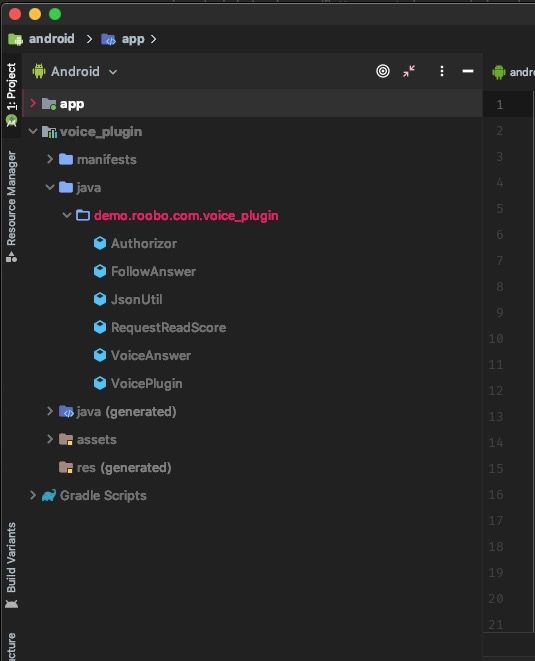
app 是插件工程example下的android的示例程序,可以用来测试android与dart的通信
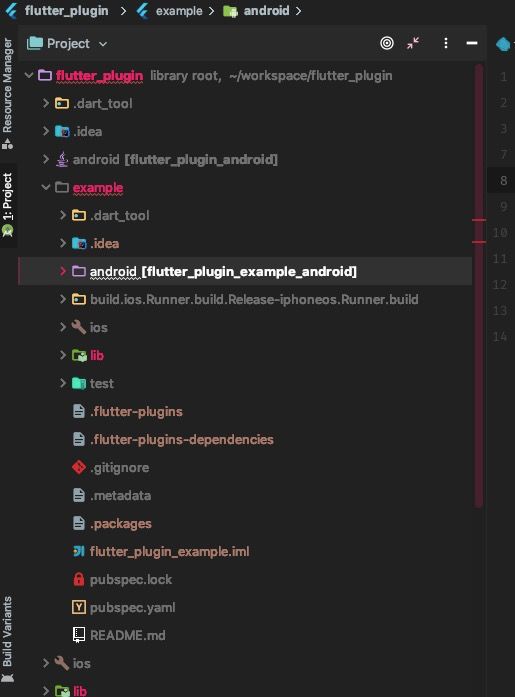
voice_plugin即android平台下实现插件api的地方
这里就像一个android工程一样 可以gradle导包 编写java或kotlin代码
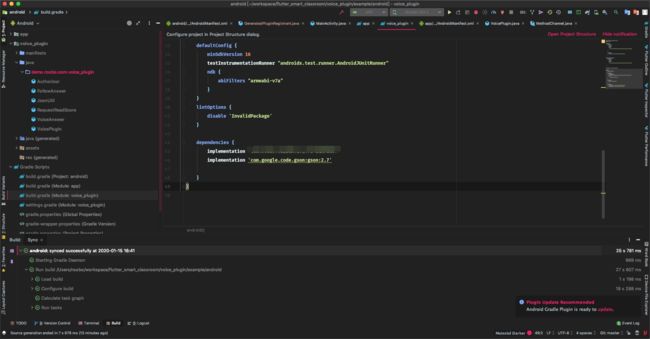
首先我们在插件工程下 lib/voice_plugin.dart定义我们需要的功能 比如我们定义了register getRead getASR platformVersion等方法
在android/src/main/java/demo/roobo/com/voice_plugin/VoicePlugin.java中的onMethodCall截获这些方法获取参数并实现相应功能并且提供返回值。
//以如下方式传递参数
static Future register(String sn, String publicKey) async {
Map<String, Object> map = {"sn": sn, "publicKey": publicKey};
await _channel.invokeMethod('register', map);
}
//以如下方式截获参数处理
private void registerAndInit(MethodCall call, Result result) {
String sn = call.argument("sn");
String publicKey = call.argument("publicKey");
Log.e("voicePlugin", " sn:" + sn + " pbk: " + publicKey);
init(mContext, sn, publicKey, result);
}
//以如下方式返回数据给flutter
//Result result result 由flutter框架创建 onMethodCall中可以得到 public void onMethodCall(MethodCall call, Result result) {}
result.success(answer.Data.pronunciation + "");
flutter插件实例
step2.1 定义api
class VoicePlugin {
static const MethodChannel _channel = const MethodChannel('voice_plugin');
static Future<String> get platformVersion async {
final String version = await _channel.invokeMethod('getPlatformVersion');
return version;
}
static Future register(String sn, String publicKey) async {
Map<String, Object> map = {"sn": sn, "publicKey": publicKey};
await _channel.invokeMethod('register', map);
}
static Future<String> get getASR async {
final String result = await _channel.invokeMethod('getASR');
return result;
}
static Future<String> getRead(String qa) async {
Map<String, Object> map = {"qa": qa};
final String result = await _channel.invokeMethod('getRead', map);
return result;
}
}
step2.2 实现android API
public class VoicePlugin implements MethodCallHandler {
private static final String TAG = "VoicePlugin";
private static Context mContext;
/**
* Plugin registration.
*/
public static void registerWith(Registrar registrar) {
final MethodChannel channel = new MethodChannel(registrar.messenger(), "voice_plugin");
channel.setMethodCallHandler(new VoicePlugin());
Log.e(TAG, "init: mContext");
mContext = registrar.context();
}
@Override
public void onMethodCall(MethodCall call, Result result) {
switch (call.method) {
case "getPlatformVersion":
result.success("Android " + android.os.Build.VERSION.RELEASE);
break;
case "register":
registerAndInit(call, result);
break;
case "getASR":
onASRClick(result);
break;
case "getRead":
onReadClick(call, result);
break;
default:
result.notImplemented();
break;
}
}
private void registerAndInit(MethodCall call, Result result) {
String sn = call.argument("sn");
String publicKey = call.argument("publicKey");
Log.e("voicePlugin", " sn:" + sn + " pbk: " + publicKey);
init(mContext, sn, publicKey, result);
}
public void onASRClick(final Result result) {
//这里我们调用了三方sdk获取结果
IRooboRecognizeEngine engine = VUISDK.getInstance().getRecognizeEngine();
engine.stopListening();
engine.setParameter(SDKConstant.Parameter.PARAMERER_AI_ON_OFF, "off");
engine.setCloudResultListener(new OnCloudResultListener() {
@Override
public void onResult(int i, String s) {
Log.d(TAG, "onASRResult() called with: i = [" + i + "], s = [" + s + "]");
Gson gson = new Gson();
VoiceAnswer voiceAnswer = gson.fromJson(s, VoiceAnswer.class);
//回执
result.success(voiceAnswer.text);
IRooboRecognizeEngine engine = VUISDK.getInstance().getRecognizeEngine();
engine.stopListening();
}
@Override
public void onError(SDKError sdkError) {
Log.d(TAG, "onError() called with: sdkError = [" + sdkError + "]");
}
});
engine.setOnVadListener(new OnVADListener() {
@Override
public void onBeginOfSpeech() {
Log.d(TAG, "onBeginOfSpeech() called");
}
@Override
public void onEndOfSpeech() {
Log.d(TAG, "onEndOfSpeech() called");
}
@Override
public void onCancelOfSpeech() {
Log.d(TAG, "onCancelOfSpeech() called");
}
@Override
public void onAudioData(byte[] bytes) {
}
});
engine.startListening();
}
public void onReadClick(MethodCall call, final Result result) {
String qa = call.argument("qa");
IRooboRecognizeEngine engine = VUISDK.getInstance().getRecognizeEngine();
engine.stopListening();
engine.setParameter(SDKConstant.Parameter.PARAMERER_ORAL_TESTING, "on");
engine.setParameter(SDKConstant.Parameter.PARAMERER_AI_CONTEXTS, "");
engine.setCloudResultListener(new OnCloudResultListener() {
@Override
public void onResult(int i, String s) {
Log.d(TAG, "onReadResult() called with: i = [" + i + "], s = [" + s + "]");
Gson gson = new Gson();
FollowAnswer answer = gson.fromJson(s, FollowAnswer.class);
result.success(answer.Data.pronunciation + "");
IRooboRecognizeEngine engine = VUISDK.getInstance().getRecognizeEngine();
engine.stopListening();
}
@Override
public void onError(SDKError sdkError) {
Log.d(TAG, "onError() called with: sdkError = [" + sdkError + "]");
}
});
engine.setOnVadListener(new OnVADListener() {
@Override
public void onBeginOfSpeech() {
Log.d(TAG, "onBeginOfSpeech() called");
}
@Override
public void onEndOfSpeech() {
Log.d(TAG, "onEndOfSpeech() called");
}
@Override
public void onCancelOfSpeech() {
Log.d(TAG, "onCancelOfSpeech() called");
}
@Override
public void onAudioData(byte[] bytes) {
}
});
engine.setParameter(
SDKConstant.Parameter.PARAMERER_ORAL_TESTING_EX,
JsonUtil.toJsonString(new RequestReadScore(1, qa)));
engine.startListening();
}
private static void init(Context context, String sn, String publicKey, final Result result) {
if (VUISDK.getInstance().hasInited()) {
Log.e(TAG, "init: has inited");
result.success("succeed");
return;
}
SDKRequiredInfo info = new SDKRequiredInfo();
info.setDeviceID(sn);
info.setAgentID("xxxxxxxxxxxxxxxxxx");
info.setPublicKey(publicKey);
info.setAgentToken("xxxxxxxxxxxxxxxxxxxxxxxxx");
ISDKSettings settings = VUISDK.getInstance().getSettings();
settings.setTokenType(AIParamInfo.TOKEN_MODE_INNER);
settings.setEnv(SDKConstant.EnvType.ENV_TEST);
settings.setLogLevel(SDKConstant.LogLevelType.LOG_LEVEL_VERBOSE);
VUISDK.getInstance().init(context, info, new ISDKInitListener() {
@Override
public void onSuccess() {
Log.d(TAG, "onSuccess() called");
IRooboRecognizeEngine engine = VUISDK.getInstance().getRecognizeEngine();
engine.setEngineEnable(SDKConstant.Engine.ENGINE_LOCAL_REC, false);
engine.setEngineEnable(SDKConstant.Engine.ENGINE_VAD, false);
engine.setEngineEnable(SDKConstant.Engine.ENGINE_WAKEUP, false);
}
@Override
public void onFailed(SDKError sdkError) {
Log.d(TAG, "onFailed() called with: sdkError = [" + sdkError + "]");
}
});
result.success("succeed");
}
}
step2.3 实现iOS API
和android 一样 实现一套ios平台代码
step2.4 flutter 调用
在pubspec.yaml中添加依赖
dependencies:
flutter:
sdk: flutter
# The following adds the Cupertino Icons font to your application.
# Use with the CupertinoIcons class for iOS style icons.
cupertino_icons: ^0.1.2
dio: ^3.0.0
shared_preferences: ^0.5.4+6
permission_handler: ^4.0.0
voice_plugin:
path: voice_plugin
//导包
import 'package:voice_plugin/voice_plugin.dart';
Future<String> getRead(String qa) async {
return await VoicePlugin.getRead(qa);
}
Future<String> getASR() async {
return await VoicePlugin.getASR;
}
//调用
getRead(msg.extra.question)
.then((str) {
NetHelper.post(
action: msg.action,
session: msg.session,
answer: str,
hostId: msg.hostId);
Navigator.pop(context);
});
getASR().then((str) {
NetHelper.post(
action: msg.action,
session: msg.session,
answer: str,
hostId: msg.hostId);
Navigator.pop(context);
});
Flutter调用原生并传递数据
static Future register(String sn, String publicKey) async {
await _channel.invokeMethod('register', {"sn": sn, "publicKey": publicKey});
}
我们将传进来的参数重新组装成了Map并传递给了invokeMethod。其中invokeMethod函数第一个参数为函数名称,即register,我们将在原生平台用到这个名字。第二个参数为要传递给原生的数据。我们看一下invokeMethod的源码:
@optionalTypeArgs
Future<T> invokeMethod<T>(String method, [ dynamic arguments ]) async {
assert(method != null);
final ByteData result = await binaryMessenger.send(
name,
codec.encodeMethodCall(MethodCall(method, arguments)),
);
if (result == null) {
throw MissingPluginException('No implementation found for method $method on channel $name');
}
final T typedResult = codec.decodeEnvelope(result);
return typedResult;
}
第二个参数是dynamic的,那么我们是否可以传递任何数据类型呢?至少语法上是没有错误的,但实际上这是不允许的,只有对应平台的codec支持的类型才能进行传递,也就是上文提到的数据类型对应表,这条规则同样适用于返回值,也就是原生给Flutter传值。请记住这条规定
在平台接收Flutter传递过来的数据
@Override
public void onMethodCall(MethodCall call, Result result) {
switch (call.method) {
case "getPlatformVersion":
result.success("Android " + android.os.Build.VERSION.RELEASE);
break;
case "register":
registerAndInit(call, result);
break;
case "getASR":
onASRClick(result);
break;
case "getRead":
onReadClick(call, result);
break;
default:
result.notImplemented();
break;
}
}
call.method是方法名称,我们要通过方法名称比对完成调用匹配。当call.method == "register"成立时,说明我们要调用register,从而进行更多的操作。
如发现call.method不存在,通过result向Flutter报告一下该方法没实现:result.notImplemented()当调用这个方法之后,我们会在Flutter层收到一个没实现该方法的异常。
iOS端也是大同小异:
- (void)handleMethodCall:(FlutterMethodCall *)call result:(FlutterResult)result {
if ([@"registerApp" isEqualToString:call.method]) {
[_fluwxWXApiHandler registerApp:call result:result];
return;
}
}
如果方法不存在:result(FlutterMethodNotImplemented);
其数据放在call.arguments,其类型为java.lang.Object,与Flutter传递过来数据类型一一对应。如果数据类型是Map,我们可以通过以下方式取出对应值:
String sn = call.argument("sn");
String publicKey = call.argument("publicKey");
IOS也一样
NSString *appId = call.arguments[@"sn"];
NSString *appId = call.arguments[@"publicKey"];
从平台回调结果给Flutter
在接收Flutter调用的时候会传递一个名字result的参数,通过result我们可以向Flutter回值有三种形式:
success,成功
error,遇到错误
notImplemented,没实现对应方法
result.success("succeed")
result.error("invalid sn", "are you sure your sn is correct ?", sn)
result("succeed");
result([FlutterError errorWithCode:@"invalid sn" message:@"are you sure your sn is correct ? " details:sn]);
平台如何调用Flutter
如果插件的功能很重,或者是异步回调,此时我们就不好使用Result 对象回传结果,比如微信分享,当我们完成分享时,我们可能将分享结果传回Flutter。微信的这些回调是异步的,
原理也一样,在原生代码中,我们也有一个MethodChannel:
val channel = MethodChannel(registrar.messenger(), "xxx")
let channel = FlutterMethodChannel(name: "xxx", binaryMessenger: registrar.messenger())
当我们拿到了MethodChannel,
val result = mapOf(
errStr to response.errStr,
WechatPluginKeys.TRANSACTION to response.transaction,
type to response.type,
errCode to response.errCode,
openId to response.openId,
WechatPluginKeys.PLATFORM to WechatPluginKeys.ANDROID
)
channel?.invokeMethod("onShareResponse", result)
NSDictionary *result = @{
description: messageResp.description == nil ?@"":messageResp.description,
errStr: messageResp.errStr == nil ? @"":messageResp.errStr,
errCode: @(messageResp.errCode),
type: messageResp.type == nil ? @2 :@(messageResp.type),
country: messageResp.country== nil ? @"":messageResp.country,
lang: messageResp.lang == nil ? @"":messageResp.lang,
fluwxKeyPlatform: fluwxKeyIOS
};
[methodChannel invokeMethod:@"onShareResponse" arguments:result];
原生调用Flutter和Flutter调用原生的方式其实是一样的,都是通过MethodChannel调用指定名称的方法,并传递数据。
Flutter的接受原生调用的方式和原生接收Flutter调用的方式应该也是样的:
final MethodChannel _channel = const MethodChannel('XXX')
..setMethodCallHandler(_handler);
Future<dynamic> _handler(MethodCall methodCall) {
if ("onShareResponse" == methodCall.method) {
_responseController.add(WeChatResponse(methodCall.arguments, WeChatResponseType.SHARE));
}
return Future.value(true);
}
稍微不一样的地方就是,在Flutter中,我们使用到了Stream:
StreamController<WeChatResponse> _responseController =
new StreamController.broadcast();
Stream<WeChatResponse> get response => _responseController.stream;
当然了不使用Stream也可以。通过Stream,我们可以更轻松地监听回调数据变化:
response.listen((data) {
//do work
});
